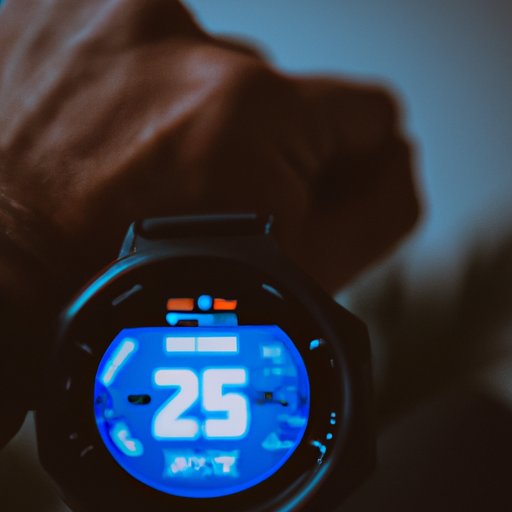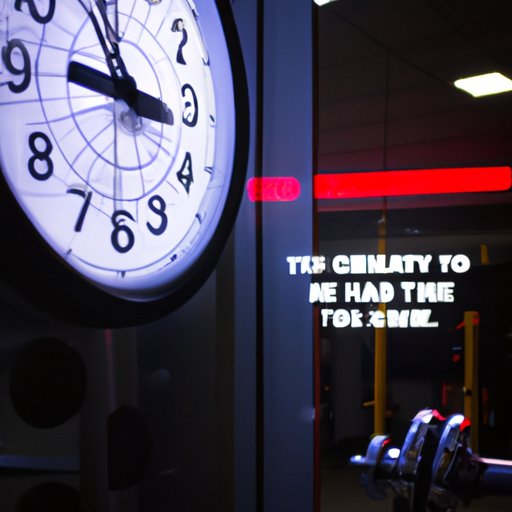Introduction
Deciding when to go to the gym can be a challenge. There are so many factors to consider: energy levels, focus, performance, muscle growth, rest and recovery, sleep quality, motivation, and more. It can be difficult to know what the best time is to maximize your workout results. This article will explore all these factors in order to help you find the best time to go to the gym for optimal results.
Analyzing the Pros and Cons of Morning vs Evening Gym Visits
When it comes to deciding on the best time to go to the gym, one of the most common questions people have is whether they should work out in the morning or at night. Let’s take a look at some of the benefits and drawbacks of each option.
Examining the Benefits of Working Out in the Morning
One of the biggest advantages of working out in the morning is that it helps jumpstart your day. Getting up early and exercising can give you an energy boost that will last throughout the day. Plus, it can help set the tone for healthy habits and provide a sense of accomplishment that can carry over into other areas of your life. By working out in the morning, you also get it out of the way so you don’t have to worry about it later in the day.
Exploring the Advantages of Exercising at Night
On the other hand, there are also some benefits to working out at night. For one, you may have more energy and focus after a full day of activities. Plus, it can serve as a great way to unwind and de-stress after a long day. Working out at night can also help you sleep better, as exercise can tire you out and make it easier to fall asleep.
Discussing How to Make the Best Decision Based on Your Own Schedule and Lifestyle
Ultimately, the best time to go to the gym is going to depend on your own schedule and lifestyle. Consider your preferences and what works best for you. If you’re a morning person and have more energy in the morning, then working out in the morning might be the better option. On the other hand, if you’re more of a night owl and prefer to work out at night, then that might be the better option for you.
Understanding How Your Circadian Rhythm Affects Your Workout
Your circadian rhythm is your body’s internal clock, which regulates your sleep-wake cycle. This cycle has a huge impact on your energy levels, focus, and performance during workouts. Depending on what time of day you work out, you may experience different levels of energy, focus, and performance.
Explaining What the Circadian Rhythm Is and How It Works
The circadian rhythm is a 24-hour cycle that is regulated by the body’s internal clock. This clock helps regulate your body’s functions, including sleep-wake cycles, energy levels, alertness, and more. Your circadian rhythm is affected by both external and internal factors, such as sunlight, temperature, hormones, and stress levels.
Investigating How This Affects Energy Levels, Focus, and Performance During Workouts
Your circadian rhythm can have an impact on your energy levels, focus, and performance during workouts. Generally speaking, your body’s peak performance times occur when your internal clock is in sync with the external environment. For example, if you’re a morning person, your body will be most alert and energetic in the morning, so this would be the best time for you to work out. On the other hand, if you’re a night person, then you may have more energy and focus at night, making it the better time for you to work out.
Determining Which Times Are Optimal for Each Individual Based on Their Own Internal Clock
Since everyone is different, the best time to go to the gym will vary from person to person. It’s important to take into account your own individual circadian rhythm and determine which times are best for you to work out. This may require some trial and error, but once you figure out the times that work best for you, you’ll be able to maximize your results and get the most out of your workouts.

Examining the Benefits of Working Out During Different Parts of the Day
In addition to understanding your own internal clock, it’s also important to consider the benefits of working out during different parts of the day. Let’s take a look at the advantages of working out early in the day, during midday, and late at night.
Exploring the Advantages of Working Out Early in the Day
Working out in the morning has many benefits. For one, it can help you wake up and get energized for the day ahead. Plus, it can help boost your metabolism and kickstart your day. Additionally, morning workouts can help reduce stress and anxiety, improve concentration, and increase productivity throughout the day.
Discussing the Benefits of Exercising During Midday
Working out during midday can also be beneficial. Exercise during this time can help improve your mood and reduce fatigue. Plus, since your body temperature is at its highest in the afternoon, you may be able to push yourself harder and get more out of your workout. Additionally, exercising during midday can help boost your immune system and reduce the risk of certain diseases.
Examining the Pros and Cons of Late-Night Workouts
Finally, let’s take a look at the advantages and disadvantages of late-night workouts. Working out at night can be beneficial because it can help you wind down and relax before bed. It can also help you sleep better since exercise can tire you out and make it easier to fall asleep. However, it’s important to note that working out too close to bedtime can disrupt your sleep, so it’s best to avoid working out within two hours of your bedtime.

Exploring How to Maximize Your Results by Choosing the Right Time for Your Workouts
In addition to considering the benefits of working out during different parts of the day, it’s also important to think about how to maximize your results by choosing the right time for your workouts. Let’s take a look at how timing can affect muscle growth and development, how long-term scheduling can affect your fitness goals, and how to maximize your results by choosing the most effective time for your workouts.
Investigating the Impact of Timing on Muscle Growth and Development
Timing can have a big impact on muscle growth and development. For example, working out in the morning can help jumpstart your metabolism and kickstart your day. Plus, it can help reduce stress and improve concentration. On the other hand, working out at night can help you unwind and relax before bed. Additionally, it can help improve your sleep quality since exercise can tire you out and make it easier to fall asleep.
Examining How Long-Term Scheduling Can Affect Your Fitness Goals
It’s also important to consider how long-term scheduling can affect your fitness goals. Sticking to a regular workout routine can help you stay motivated and on track with your goals. Additionally, creating a long-term plan can help you stay focused and ensure that you’re consistently working towards your goals.
Looking Into How to Maximize Your Results by Choosing the Most Effective Time for Your Workouts
Finally, it’s important to think about how to maximize your results by choosing the most effective time for your workouts. To do this, you need to consider your own individual circadian rhythm, preferences, and lifestyle. Additionally, you need to think about the benefits of working out during different parts of the day and how timing can affect muscle growth and development. Once you understand these factors, you’ll be able to make an informed decision about the best time for you to go to the gym.
Examining the Impact of Long-Term Scheduling on Your Fitness Goals
In addition to understanding how to maximize your results by choosing the right time for your workouts, it’s also important to consider the impact of long-term scheduling on your fitness goals. Let’s take a look at how sticking to a regular workout routine can help you stay motivated, how to create an optimal long-term plan for yourself, and the impact of consistency on achieving your fitness goals.
Explaining How Sticking to a Regular Workout Routine Can Help You Stay Motivated
Sticking to a regular workout routine can help you stay motivated and on track with your fitness goals. Having a set schedule can help you stay focused and ensure that you’re consistently working towards your goals. Additionally, planning ahead can help you anticipate any potential challenges and come up with solutions in advance.
Discussing How to Create an Optimal Long-Term Plan for Yourself
Creating an optimal long-term plan for yourself is key to achieving your fitness goals. Start by considering your own individual circadian rhythm and preferences. Then, think about the benefits of working out during different parts of the day and how timing can affect muscle growth and development. Finally, come up with a plan that fits with your lifestyle and allows you to maximize your results.
Examining the Impact of Consistency and How It Relates to Achieving Your Fitness Goals
It’s also important to consider the impact of consistency on achieving your fitness goals. Consistency is key to seeing results, so it’s important to stick to your plan and be consistent with your workouts. Additionally, taking breaks and resting when needed can help you stay motivated and prevent burnout.

Discovering the Optimal Time for Muscles to Recover After a Workout
In addition to understanding the importance of consistency and long-term scheduling, it’s also important to consider the optimal time for muscles to recover after a workout. Let’s take a look at how muscle recovery is affected by the time of day, the importance of rest and recovery in order to achieve optimal results, and the best time to allow muscles to recover after a workout.
Investigating How Muscle Recovery Is Affected by the Time of Day
Muscle recovery is affected by the time of day. Generally speaking, the body is most efficient at recovering from exercise in the afternoon. This is because your body temperature is at its highest in the afternoon, which helps promote blood flow and allows your muscles to recover more quickly. Additionally, your body is better equipped to repair muscle damage in the afternoon than it is in the morning.
Exploring the Importance of Rest and Recovery in Order to Achieve Optimal Results
Rest and recovery are essential for achieving optimal results. Taking breaks and allowing your body to rest is key to preventing burnout and helping your muscles recover. Additionally, getting enough sleep is important for allowing your body to repair itself and prepare for the next day’s workout.
Examining the Best Time to Allow Muscles to Recover After a Workout
The best time to allow muscles to recover after a workout is in the afternoon. As mentioned above, your body temperature is at its highest in the afternoon, which helps promote blood flow and allows your muscles to recover more quickly. Additionally, your body is better equipped to repair muscle damage in the afternoon than it is in the morning.
Investigating the Relationship Between Sleep Quality and Exercise Timing
Finally, let’s take a look at the relationship between sleep quality and exercise timing. Exercise can have a big impact on sleep quality, so it’s important to consider how your workout schedule can affect your sleep. Let’s take a look at how sleep quality can be impacted by the time of day you exercise, the effects of poor sleep on physical and mental performance, and the importance of getting enough rest in order to optimize your workouts.
Exploring How Sleep Quality Can Be Impacted by the Time of Day You Exercise
Sleep quality can be impacted by the time of day you exercise. Generally speaking, it’s best to avoid working out too close to bedtime as this can disrupt your sleep. Additionally, working out too late at night can cause you to feel restless and make it difficult to fall asleep. On the other hand, working out earlier in the day can help you sleep better since exercise can tire you out and make it easier to fall asleep.
Examining the Effects of Poor Sleep on Physical and Mental Performance
Poor sleep can have a big impact on both physical and mental performance. Not getting enough sleep can cause fatigue, irritability, difficulty concentrating, and impaired judgment. Additionally, it can lead to decreased energy levels, which can affect your ability to perform at your best during workouts.
Discussing the Importance of Getting Enough Rest in Order to Optimize Your Workouts
Getting enough rest is essential for optimizing your workouts. Not only does it help you recover from workouts and prevent burnout, but it also helps improve your overall performance.
(Note: Is this article not meeting your expectations? Do you have knowledge or insights to share? Unlock new opportunities and expand your reach by joining our authors team. Click Registration to join us and share your expertise with our readers.)
